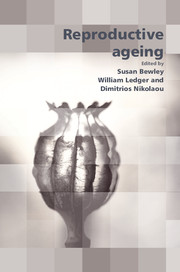Book contents
- Frontmatter
- Contents
- Participants
- Declarations of personal interest
- Preface
- SECTION 1 BACKGROUND TO AGEING AND DEMOGRAPHICS
- SECTION 2 BASIC SCIENCE OF REPRODUCTIVE AGEING
- SECTION 3 PREGNANCY: THE AGEING MOTHER AND MEDICAL NEEDS
- SECTION 4 THE OUTCOMES: CHILDREN AND MOTHERS
- SECTION 5 FUTURE FERTILITY INSURANCE: SCREENING, CRYOPRESERVATION OR EGG DONORS?
- SECTION 6 SEX BEYOND AND AFTER FERTILITY
- SECTION 7 REPRODUCTIVE AGEING AND THE RCOG: AN INTERNATIONAL COLLEGE
- SECTION 8 FERTILITY TREATMENT: SCIENCE AND REALITY – THE NHS AND THE MARKET
- SECTION 9 THE FUTURE: DREAMS AND WAKING UP
- 31 In our wildest dreams: making gametes
- 32 The future: dreams
- 33 Managing expectations and achieving realism: the individual journey from hope to closure
- 34 Managing expectations and achieving realism: the ‘realpolitik’ of reproductive ageing and its consequences
- 35 The future: waking up
- SECTION 10 CONSENSUS VIEWS
- Index
32 - The future: dreams
from SECTION 9 - THE FUTURE: DREAMS AND WAKING UP
Published online by Cambridge University Press: 05 February 2014
- Frontmatter
- Contents
- Participants
- Declarations of personal interest
- Preface
- SECTION 1 BACKGROUND TO AGEING AND DEMOGRAPHICS
- SECTION 2 BASIC SCIENCE OF REPRODUCTIVE AGEING
- SECTION 3 PREGNANCY: THE AGEING MOTHER AND MEDICAL NEEDS
- SECTION 4 THE OUTCOMES: CHILDREN AND MOTHERS
- SECTION 5 FUTURE FERTILITY INSURANCE: SCREENING, CRYOPRESERVATION OR EGG DONORS?
- SECTION 6 SEX BEYOND AND AFTER FERTILITY
- SECTION 7 REPRODUCTIVE AGEING AND THE RCOG: AN INTERNATIONAL COLLEGE
- SECTION 8 FERTILITY TREATMENT: SCIENCE AND REALITY – THE NHS AND THE MARKET
- SECTION 9 THE FUTURE: DREAMS AND WAKING UP
- 31 In our wildest dreams: making gametes
- 32 The future: dreams
- 33 Managing expectations and achieving realism: the individual journey from hope to closure
- 34 Managing expectations and achieving realism: the ‘realpolitik’ of reproductive ageing and its consequences
- 35 The future: waking up
- SECTION 10 CONSENSUS VIEWS
- Index
Summary
Siladitya Bhattacharya: The development of inducible pluripotent stem [iPS] cells is terribly exciting. Is there a timescale to this?
Peter Braude: There is a film called The NeverEnding Story [laughter]. I don't know the timescale but I can say that even 2 years ago the idea of an iPS cell line was outrageous. Then we got to this point and it now looks as if not very many transcriptional factors are going to be needed. The development was jumped on by the anti-abortion lobby who immediately claimed that this is the future and we can stop all ongoing embryo stem cell research. I imagine President Bush would like this very much. I do not think there is a short timescale. Therapeutic use is still a long way off, but every time we said that in the past, something happened very fast.
Susan Bewley: Can I ask a question about the 20—30 years of these amazing breakthroughs. What is the relationship with use in veterinary science? Has that been a predictor of what could happen in the human, or is it an entirely separate field?
Peter Braude: Generally, veterinary science has been helpful, barring one anomaly, that is that no one got ICSI to work in animals. Is that correct?
Roger Gosden: In horses ICSI is extremely difficult.
Keywords
- Type
- Chapter
- Information
- Reproductive Ageing , pp. 329 - 330Publisher: Cambridge University PressPrint publication year: 2009



